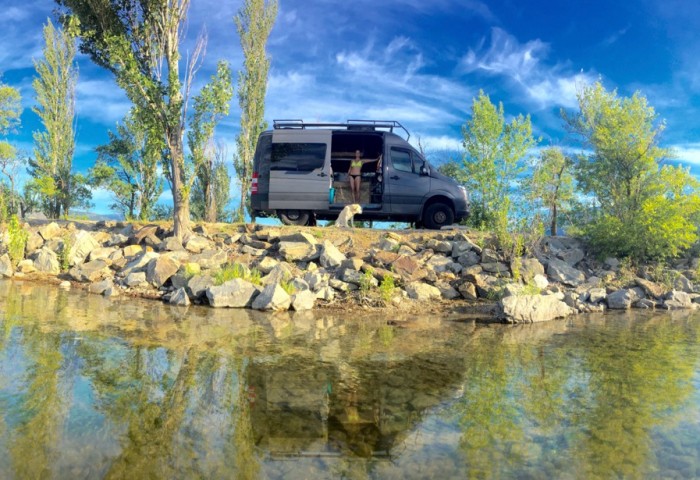You value freedom. You value flexibility. You value doing good work.
And, you want to do it from anywhere.
Chances are, you’ve had your eye on the remote working culture for awhile, whether it’s the lure of being able to work in your pajamas if you choose, or to work with some innovative and impactful companies. It’s likely that you’ve been keeping your eye on companies that are hiring remotely, or thinking about how you can go global with your skills through freelance work.
As someone who has worked remotely, and in-office, for startups and nonprofits, here are the 8 questions you must consider about your lifestyle, your values, and your personality before transitioning to remote work.
Question 1: does being able to work from wherever make you happy, even if you’re working alone most of the time?
Ask anyone who works remotely and they’ll tell you the majority of their time is spent alone, communicating virtually with team members, clients, and friends. As someone who works remotely and highly values the freedom and flexibility that comes with this type of lifestyle, I have traded from the busy (and often less productive) office life to working mostly from my apartment alone, or the local coffee shop. With less people and less conversations, it’s easier to do better work, which makes what I do more fulfilling for me. That being said, I’ve known people who work better in office environments and don’t fare well when working remotely. Often, these people shift back into an office role, so consider what makes you happiest about your work space. If working in your own space sounds good to you, or is something you already do, transitioning to remote work could be an easy transition for you.

This is my home office area.
Question 2: do apps and cloud-based tools excite you?
If you said yes, you’re +1 for transitioning well to remote working. Regardless if you’re working for a company, or working for yourself, to stay organized – whether you’re working from Thailand or your couch in Portland – you’ll need the tools to help you do your job no matter where you are. The majority of my day consists of managing content in WordPress, communicating with my team via Skype and Google Docs & Gmail, and scheduling the editorial calendar in Trello. The more well-versed you are in cloud-based tools, the better able you can stay organized anywhere you work from and transition well from any remote-based role.
Question 3: do you consider communication a strength of yours?
You don’t necessarily need to be a fantastic writer to be good at communication. When working on remote teams, or as a contractor / freelancer, effective and clear communication is by far what is needed most, as you’ll be communicating with potential clients / customers and team members online, so you must be able to communicate well over virtual methods. Like anything, there is a learning curve, but the key to successful communication in remote teams is clarity, brevity and added value to a conversation.
Question 4: do you enjoy structure and processes?
One of the greatest benefits of working remotely is the flexibility to create your lifestyle, including your day to day, around what is most important and fulfilling for your professional and personal goals. Some people struggle immensely with structuring their own day, waiting for someone else to tell them what to do. Don’t let this be you! Experiment now with adding what’s most important to you within the structure of your day. Prioritize the important things and you’ll be on your way to transitioning easily.
Question 5: what does your daily routine look like?
Working remotely attracts people like you and me, because we want the opportunity to live life on our own terms, do good work, and preferably do it from anywhere. Structure gives impact to our efforts, so consider what you find important in your day to day. Remember: you’re the sole director of your day once you transition to remote work, so figuring out what works for you might take some time.
For me, I tend to wake up, get ready as if I was really “going to work” (shower, hair, makeup, etc), eat breakfast and set out to the coffee shop for the morning. I typically work about 4 hours from a local coffee shop, then finish my day at home. Although there is an allure to work in your PJs (and I totally do this from time to time), I’ve found that I do better work when I’ve gone through my routine of ‘getting ready’ for my work day.
Question 6: where do you do your best work?
It’s no surprise that the biggest allure of working remotely is being able to work from… anywhere. Take note of where you are the most productive: is it at a buzzing coffee shop, the library, or from your home office? If you want to transition easily to remote work, considering where you feel most inspired to do work will make you more productive and successful, no matter what work you create. If you don’t know where you do your best work, are you willing to find out?

Workfrom: Townshend’s Tea
Question 7: do you have the necessary tools to do your job effectively?
Having some basic tools and resources necessary for your work makes it easier on you, your team and your clients. Firstly, you’ll want a laptop, or something that makes it easy for you to work from anywhere. Reliable internet makes your job a whole lot easier if your work requires access to internet at almost all times, like my role. You’ll also want to think about the nice-to-haves, such as a mouse, headphones, a bag for your laptop, and any other tools that simplify your working life.
When working from the coffee shop, I typically bring my laptop, mouse and mousepad, headphones, and laptop charger. The company I work for also provides one e-book a month, so having a Kindle makes it easy for me to read while working from anywhere. And, that’s usually all I need to do good work from anywhere!
As you can see, it doesn’t require much to work from anywhere, so take inventory of your tools and make sure you have everything needed to be successful, no matter where you are in the world.

Workfrom: River Maiden Artisan Coffee
Question 8: how do you feel about work / life balance?
There’s no doubt that working from home can blur the lines between personal life and work life. Before transitioning to remote work, consider that the majority of your work may be done from your home – or, at least you have the option from working from home every day. It’s all about setting boundaries that work for you and keep you happy. You’ll know boundaries need to be enforced when you start to feel burned out, resentful, or bored from your work.

Working remotely is one of my favorite experiences as a professional, because it gives me the opportunity to work with people around the world, choose whatever coffee shop I want to work from that day, and do work that I find meaningful and fulfilling. Not only that, but I have more time and freedom to do side projects that are meaningful, like helping people with their crowdfunding strategies and creating art, because my commute is so minimal.
If anything, working remotely has taught me more about how I work best, what inspires me the most, and where I do my best work. If you can sit down and carefully consider your own personality, your values, and and your ideal lifestyle, you’ll know if remote work is right for you.
And, for the sake of doing good work, freedom, and making an impact, I hope that it is.





Responses